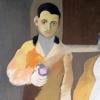
For more than a century, composer Mary Kouyoumdjian’s family has been buffeted by terror and violence. No wonder she’s drawn to stories of intergenerational trauma.
Her grandparents fled the 1915 Armenian genocide, ultimately landing in Lebanon. Their safe haven was then shattered in the mid-1970s by a civil war that would end up lasting 15 years. Much of Kouyoumdjian’s family is still in Lebanon today, recovering from the latest round of bombings and lamenting the fact that their country has become a battlefield.
Kouyoumdjian was born and raised in the San Francisco Bay Area, so she hasn’t personally experienced the horrors inflicted on so much of her family. But their stories have impacted her greatly, and that emotional imprint can be felt in her opera Adoration, which has its West Coast premiere Feb. 19–23 at REDCAT in downtown Los Angeles.
“This is an extremely dark story,” Kouyoumdjian said in an interview from her New York City home. “While it tackles larger ideas about our fascination with terrorism and prejudice, at its core it’s about a family that’s grieving and how they treat each other during the grieving process.
“That story — losing someone we love and the complications of relationships after a loss — is extremely sorrowful.”

This staging, which follows the work’s world premiere in New York a little over a year ago, is a co-production of Los Angeles Opera and Beth Morrison Projects, the latter an organization specializing in nurturing new operas. “I had been tracking Mary and following her work,” founder Beth Morrison explained. “She seemed ready to embark on her first opera.”
Morrison discovered that Kouyoumdjian and librettist Royce Vavrek were both obsessed with the films of director Atom Egoyan — Kouyoumdjian because of their shared Armenian heritage, Vavrek due to their mutual Canadian citizenship. The composer and librettist wrote to the Oscar-nominated filmmaker and asked for permission to adapt one of his screenplays. He replied that they could choose any film they wished.
It was Morrison who picked 2008’s Adoration, which can be seen as an oblique response to the 9/11 terrorist attacks. The film focuses on two characters: Simon, an orphaned high school student, and his teacher Sabine, a Lebanese immigrant. The Rotten Tomatoes site summarizes the plot this way:
“[An] assignment in a high school French class leads to unexpected drama. ... The son of a Palestinian father, Simon takes an article about a terrorist plot and weaves it into his own tragic family history. Encouraged by Sabine, Simon passes the tale off as a true story — but the ramifications of this action, which end up online, deliver surprising results.”

“I’m very drawn to stories that explore the way immigrants are treated in the United States, particularly those from displaced communities,” Kouyoumdjian said. “9/11 took place the first year I was in college; it was a pivotal moment in my life. This film is a response to the way society changed after.”
It’s hardly a period piece, however.
“Social media plays an enormous role in this story,” Morrison noted. “Because of social media, there is basically no [commonly accepted] truth anymore. Everybody has their own truth, which evolves from their own echo chamber. That’s a huge part of what the story’s about, and it’s even more true today than it was when the movie came out in 2008.”
Morrison added that racism, which plays a major role in the story, has hardly lost its relevance either.
“Having biases is an extremely human thing,” Kouyoumdjian said. “That doesn’t mean it’s OK. But it’s a lot closer to home than we often admit to ourselves.”
Kouyoumdjian’s grew up in Pleasant Hill, outside San Francisco. “My parents owned a deli, and we all worked there,” she recalled. “While they loved music, concerts were never on their radar.
“My parents signed my brother and I up for piano and organ lessons through a music store in the mall. That led [me] to study with different piano teachers. I never loved playing the piano, but I loved film music. I specifically fell in love with Jerry Goldsmith’s score for Rudy. Along with [Greek composer and producer] Yanni, Jerry Goldsmith was my exposure to the idea that I could be a composer.”

Kouyoumdjian then headed south to UC San Diego, where she studied biology before changing her major to music. “Luckily, the school had a beautifully experimental music program,” she said. “[Percussionist] Steven Schick taught my first new-music ensemble class. They didn’t require an audition, which was great because I had nothing to my name.”
That soon changed, as Kouyoumdjian gradually settled into her own musical style, which mixes ancient and modern sounds.
“My way into integrating folk into my music came from my dad having a lot of records of 1970s Lebanese R&B and pop,” she explained. “Also, I would go to the record store and pick out different Kronos Quartet albums. Since they work with artists from all over the world, I came to appreciate a lot of different folk songs.”
Appropriately enough, Kouyoumdjian’s professional breakthrough came when Kronos asked her to write a piece, which became Bombs of Beirut. She was 29.
“I remember when [violinist] David Harrington left a voicemail on my phone about coordinating a commission,” she said. “It was life-changing.”
A 2024 Pulitzer Prize finalist for her work Paper Pianos, Kouyoumdjian, 41, will see the release this year of two recordings devoted to her music. One — Witness, expected from Phenotypic Recordings on March 14 — features Kronos, while the other is Adoration.
At its premiere, the opera was not received with universal, well, adoration. Several reviewers, echoing complaints from the film’s detractors, didn’t feel the piece worked dramatically.
Kouyoumdjian, however, said she found the sometimes obscure material inspired her as a composer.
“One of the core elements I was trying to pull in from the film is that it has a lot of space between the dialogue,” she said. “You get to watch characters taking in information, understanding [what it means], and deciding what their next action should be. I tried to create that same sense of space so that audiences in the concert hall can have time to reflect on some of the really large statements the characters are sharing.
“The characters aren’t very clear regarding what they are feeling and what their motivations are,” she added. “That leaves a lot of room for interpretation on the part of the audience.
“The pieces that move me the most give me the space to process information and come to my own conclusions.”




